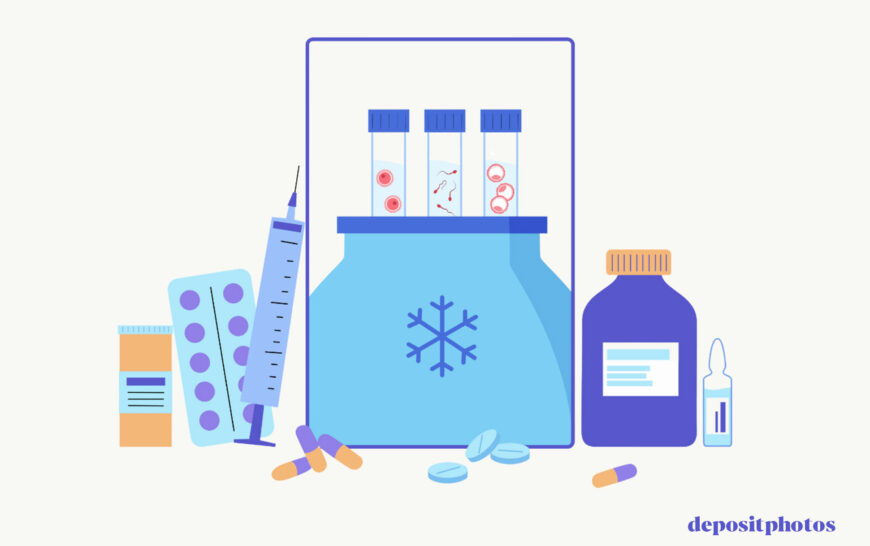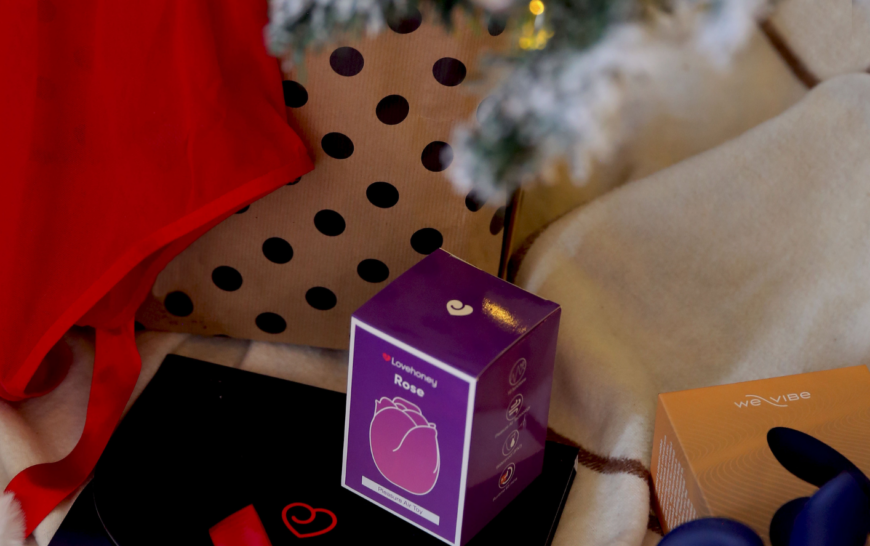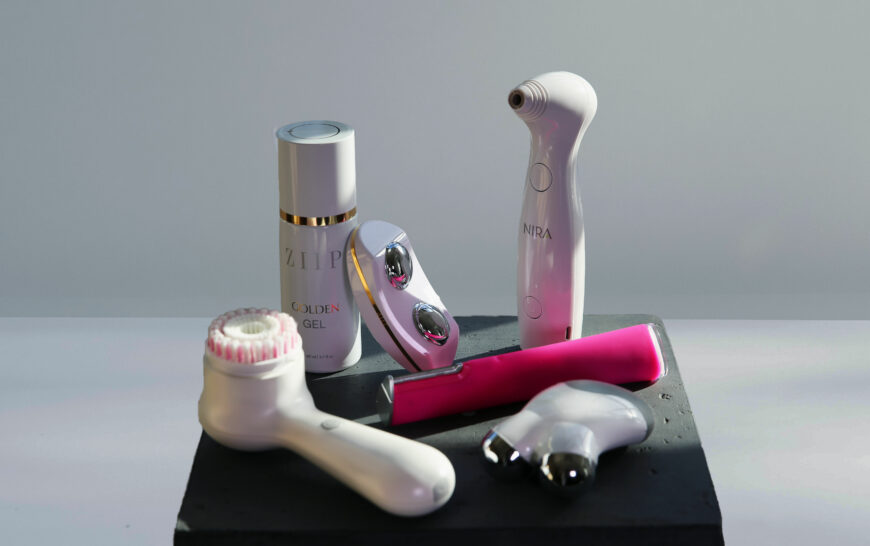
For fans of the Netflix favourite, Selling Sunset, you’ll remember Mary Fitzgerald sharing her fertility journey on the show and undergoing treatments to freeze her eggs so that she and her husband Romain Bonnet could have the best chance of having a family when they’re ready.
In a video posted to her Instagram last month, the real estate agent, 41, opened up about their recent struggles and urged younger women to think about their fertility sooner rather than later.
Captioning the heartfelt video, she said, “Update on my embryo freezing journey. This was definitely not the news we were hoping to get and while it is super disappointing, we are just keeping our heads up. PLEASE consider doing this at the youngest age possible if you know/think you want to have children. Sharing my experience in hopes of helping anyone who is interested in doing this process.”
So, when is the ‘right’ time to consider egg freezing and what are the next steps?
For women and folks with wombs, your chances of conceiving naturally decrease as you get older because the quality and number of eggs drop with age. Egg freezing is a way of attempting to preserve a person’s fertility so they may try and have children at a later date.
With that in mind, anyone who’s yet to meet the right person, unsure about having children, focusing on their career or undergoing treatment that can affect your fertility, egg freezing can be a great option if you’re not ready for pregnancy right now but want to preserve your eggs for future use.
To find out more, we had the pleasure of speaking to the fairy godmother of fertility aka Zita West, internationally-renowned fertility and conception expert and Founder of the Zita West fertility clinic.
From what to expect during the procedure to success rates and the optimum age to go for it, here’s everything there is to know about freezing your eggs, so that you can consider your options and get strategic with your fertility!
Q. Why would someone want to consider egg freezing?
Increasingly, I see more and more women coming into the clinic wanting to freeze their eggs, particularly if they have reached their late thirties but don’t feel ready to have children, haven’t met the right partner or have been diagnosed with an illness such as cancer.
It is important to highlight that choosing to freeze your eggs doesn’t have a detrimental effect on your future fertility and it doesn’t use up your eggs or exhaust your existing supply. Zita West
While the techniques have greatly improved over the years with a process called vitrification, which helps make it easier to freeze eggs, there remains a number of factors for women to consider around preserving their eggs. It is important to highlight that choosing to freeze your eggs doesn’t have a detrimental effect on your future fertility and it doesn’t use up your eggs or exhaust your existing supply. However, you do need to bear in mind as well that although this is a routine procedure, any procedure comes with a risk, so it’s important that you’re counselled on everything, which will happen at that initial consultation.
Q. How does the egg freezing process work?
The egg freezing procedure works in a very similar way to IVF but without having the embryo to put back. There is an initial consultation where a woman will have her egg reserves assessed by blood tests looking at AMH, which is the Anti Mullerian Hormone, and an ultrasound scan, which is called an antral follicle count, which counts the number of follicles on the ovaries. This gives the doctors an idea of how a woman is likely to respond to treatment and to decide on the protocols and drugs to use as well as a rough indication of how it will go.
The procedure involves a woman stimulating egg production as she would ahead of IVF, giving herself injections every day for around 10 daysZita West
The procedure involves a woman stimulating egg production as she would ahead of IVF, giving herself injections every day for around 10 days on the protocol or treatment that’s been decided, which will stimulate the follicles on the ovaries to grow. During this time, she will have blood tests and scans to assess how stimulation is going as well as looking at factors such as if there’s over stimulation. She will then be given what is called a trigger injection to release the eggs and will then undergo a procedure in theatre under anaesthetic where the eggs will be collected and assessed for their maturity which is called grading, and then they are frozen.
It’s quite an intense procedure and many women underestimate what is involved – the only difference with this and IVF is that the eggs are then fertilised at this point and made into embryos when you’re undergoing IVF.
Once you decide you want to use them, the process would then be the same as IVF where the egg is then fertilised with your partner’s or a donor’s sperm.
Q. How long does egg collection take and is it a painful procedure?
Egg collection takes place around 37 hours after the trigger injection and it requires only light sedation, not as strong as a general anaesthetic. You can expect to be at the clinic for around 4 hours and you will need someone to take you home afterwards.
Q. How long is the recovery / downtime after the procedure?
You wouldn’t go back to work that day so you may have a day or so off, but it depends on how many eggs have been produced and collected. If you’ve had a lot, then you’re going to be quite sore abdominally and you need to rest.
Q. Is there an ideal age to freeze your eggs?
Age is the biggest determining factor in the success of egg freezing. Typically, the younger the eggs, the more chromosomally normal they will be, while the older you are, there is an increasing chance of more chromosomally abnormal eggs and a likelihood of lower reserves.
For the best chance of success, it is better to freeze your eggs in your early 30sZita West
This therefore means you may have to undergo two or three cycles to get the amount needed and you will have to take into account the cost, as well as the emotional toll it may take on you. Many of the women I see are aged around 39 or 40, which is often very late to freeze eggs because of the chances of reserves being lower and therefore the number of eggs available to successfully freeze is also much lower. For the best chance of success, it is better to freeze your eggs in your early 30s, however, I understand that this is hard for many women, as you may not be ready to undergo the procedure at that point in your life.
Q. How many rounds are required for egg retrieval?
If you’re 37 or younger and have a normal ovarian reserve you’re likely to retrieve around 13 eggs per cycle. If you’re older than 38 however and have a low ovarian reserve, ideally you will want to freeze 20-30 eggs in order to achieve a baby and this is rarely possible in just one egg freeze cycle.
Q. How many eggs would you be looking to retrieve to be able to freeze for future use?
It’s important to realise that a number of eggs will be lost during the thawing process, so if the count is low, it will mean that you will have to do the procedure more than once in order to get the amount needed to increase your chances of getting pregnant. It is also important to understand that it is not just about the production of eggs, it is about ensuring we get mature eggs that are viable for freezing.
Q. Once a patient has decided they want to use the eggs they’ve frozen, what’s the next step? Is it the same as IVF at that point?
Many women I see are unaware of the fact that egg freezing involves going through a similar process to IVF in order to collect the eggs. To collect the eggs, your ovaries need to be stimulated, which involves injections and you will also have a number of scans to check how your follicles are growing. You produce lots of eggs in any one month during a natural cycle but only one egg is usually released, so for egg freezing the aim is to produce a larger number of eggs.
Q. What’s the success rate for IVF with frozen eggs?
To date, there have not been enough live births in the UK to be able to satisfactorily assess the success rate of egg freezing, but indications suggest it is between 30 – 50%.
Q. How much does egg freezing cost?
On average, it costs around £5,000 to do the procedure. So you can imagine, if you’re doing two or three rounds of egg collection then it can become rather expensive.
Q. Once your eggs are frozen, how long do they last?
UK regulation only permits eggs to be frozen for 10 years. There is the possibility of obtaining an extension for up to 55 years, but only if you are able to demonstrate that you have become prematurely infertile. However, it is important to understand that if you experience normal age-related fertility decline then you won’t be considered prematurely infertile and would not be able to extend the storage period of your eggs.
Q. Do you have to pay to store them, at all?
This is definitely something that needs to be considered when first thinking about egg freezing, as it is worth bearing in mind that once your eggs have been harvested, you’ll need to pay for storage. This can be several hundreds of pounds per month, but many clinics offer egg freezing packages, which include storage for two to three years.
Q. Can you do anything to improve your chances of a successful outcome / improve egg quality?
I am a big believer in the importance of preparation on every level – mentally, physically and emotionally – prior to undergoing the egg freezing procedure to help improve the quality of your eggs.
One of the most important ways a woman can prepare for egg freezing, is to ensure the specific nutritional requirements of an egg are being met.
Zita West
This means building nutrients into your diet or looking at supplements such as antioxidants and inositol where necessary, as they can really help in that preparation process and make sure you give yourself the best chance of success.
Q. Would you recommend egg freezing for someone who is considering it?
In my opinion, I think egg freezing is a good solution. I think it offers women options, which they haven’t had before, and for many women it is about looking back and having no regrets.
For so many women, they may be ambivalent about having a baby, they may not have met the right person or be at the right stage in their lives, then they wake up at 40 and decide that they do want a baby, so egg freezing does offer them hope. The biggest factor I try to get across to women is they should prepare for delays in fertility – as, on average, it can take eight months to get pregnant and miscarriage is quite common. So, then a year has gone by without a pregnancy, and you pick yourself up and start again, which is very hard to do – it’s all about looking ahead and being strategic about your fertility.




